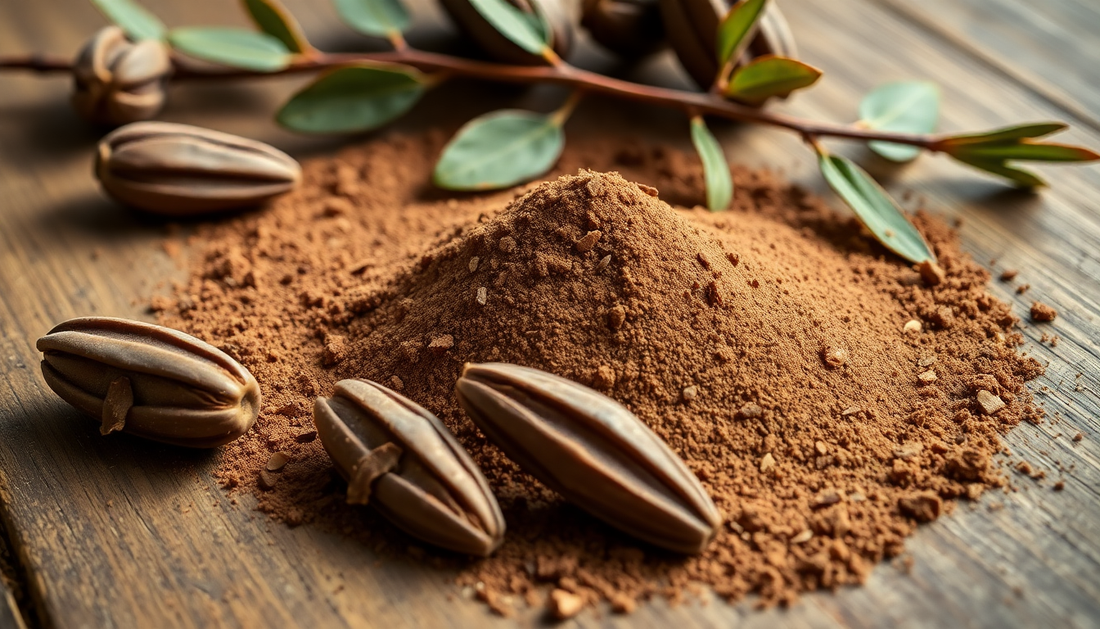La poudre de caroube est un aliment de base dans de nombreux foyers depuis des décennies, offrant une alternative naturelle et nutritive au chocolat traditionnel. Cet ingrédient polyvalent, issu des gousses du caroubier, a gagné en popularité auprès des personnes soucieuses de leur santé et de celles qui recherchent une option sans caféine et faible en sucre. Dans ce guide complet, nous vous plongerons dans l'univers fascinant de la poudre de caroube, en explorant ses origines, son profil nutritionnel, ses bienfaits pour la santé et ses applications culinaires.
Qu'est-ce que la poudre de caroube ?
La poudre de caroube est une substance naturelle, semblable au cacao, obtenue à partir des gousses séchées et torréfiées du caroubier (Ceratonia siliqua), un arbre à feuilles persistantes originaire du Moyen-Orient et de la région méditerranéenne. Contrairement au cacao, la poudre de caroube est naturellement sans caféine et contient beaucoup moins de matières grasses et de sucre, ce qui en fait un choix intéressant pour ceux qui recherchent une alternative plus saine au chocolat.
Le caroubier est cultivé depuis des siècles. Ses gousses et ses graines sont utilisées à diverses fins, notamment pour l'alimentation animale, la production de gomme et, bien sûr, pour la fabrication de poudre de caroube. Cet ingrédient polyvalent possède une saveur riche et légèrement sucrée qui peut être utilisée dans de nombreuses applications culinaires, des pâtisseries aux boissons, et même comme substitut du chocolat dans de nombreuses recettes.
Origines géographiques et consommation mondiale
Les caroubiers poussent principalement dans le bassin méditerranéen, les plus grands producteurs étant des pays comme l'Espagne, l'Italie, la Grèce et Chypre. Ces climats chauds et arides offrent des conditions idéales à la croissance du caroubier, dont les gousses sont récoltées et transformées en poudre si appréciée.
Si la poudre de caroube est un aliment de base de la cuisine méditerranéenne depuis des siècles, sa popularité s'est répandue dans le monde entier ces dernières années. Des pays comme Israël, la Turquie et le Maroc sont également d'importants producteurs et consommateurs de caroube, la poudre étant utilisée dans les desserts traditionnels, les en-cas et même comme substitut au café.
Il est intéressant de noter que la consommation mondiale de poudre de caroube est en hausse, stimulée par la demande croissante d'alternatives naturelles et végétales aux ingrédients traditionnels. À mesure que les consommateurs se soucient de leur santé et recherchent des options alimentaires durables, l'attrait de la poudre de caroube, ingrédient polyvalent et nutritif, ne cesse de croître.
Profil nutritionnel et bienfaits pour la santé
L'une des principales raisons de la popularité croissante de la poudre de caroube réside dans son excellent profil nutritionnel. Contrairement au cacao, riche en matières grasses et en caféine, la poudre de caroube est pauvre en matières grasses, en sucre et en calories, tout en apportant un éventail de vitamines, de minéraux et de fibres essentiels.
Répartition des macronutriments
La poudre de caroube est principalement composée de glucides, avec une faible quantité de protéines et une teneur négligeable en matières grasses. Une portion de 100 grammes de poudre de caroube contient :
- Glucides : 83 grammes
- Protéines : 6 grammes
- Matières grasses : 0,6 gramme
Teneur en micronutriments
La poudre de caroube est une riche source de plusieurs vitamines et minéraux essentiels, notamment :
- Calcium : La poudre de caroube est une excellente source de calcium, une portion de 100 grammes fournissant plus de 300 milligrammes de ce minéral essentiel.
- Fer : La poudre de caroube est également une bonne source de fer, une portion de 100 grammes contenant environ 4 milligrammes de ce nutriment essentiel.
- Magnésium : La poudre de caroube est une excellente source de magnésium, une portion de 100 grammes fournissant plus de 100 milligrammes de ce minéral important.
- Fibres : La poudre de caroube est riche en fibres, une portion de 100 grammes contenant environ 47 grammes de fibres alimentaires.
Avantages pour la santé
Le profil nutritionnel unique de la poudre de caroube offre une gamme d’avantages potentiels pour la santé :
- Santé digestive : La teneur élevée en fibres de la poudre de caroube peut aider à favoriser une digestion saine et la régularité, ce qui en fait un ajout précieux au régime alimentaire des personnes souffrant de problèmes digestifs.
- Régulation de la glycémie : Contrairement au chocolat, qui peut faire grimper le taux de sucre dans le sang, la poudre de caroube a un faible indice glycémique, ce qui en fait un choix plus sûr pour les personnes diabétiques ou celles qui cherchent à gérer leur taux de sucre dans le sang.
- Santé cardiovasculaire : La combinaison de fibres, de minéraux et l’absence de caféine et de matières grasses dans la poudre de caroube peuvent contribuer à améliorer la santé cardiovasculaire et à réduire le risque de maladie cardiaque.
- Propriétés antioxydantes : La poudre de caroube contient des polyphénols et d’autres antioxydants qui peuvent aider à protéger le corps contre le stress oxydatif et à réduire le risque de maladies chroniques.
Poudre de caroube vs chocolat : une comparaison
Bien que la poudre de caroube et le chocolat puissent sembler similaires, leur composition et leurs effets sur la santé sont très différents. Comprendre les principales différences entre les deux peut vous aider à faire un choix éclairé en fonction de vos préférences alimentaires et de vos objectifs de santé.
Différences nutritionnelles
La principale différence entre la poudre de caroube et le chocolat réside dans leur teneur en matières grasses et en sucre. Le chocolat est riche en ces deux éléments : une portion typique de 100 grammes contient environ 53 grammes de matières grasses et 53 grammes de sucre. En revanche, la poudre de caroube est pauvre en matières grasses (0,6 gramme pour 100 grammes) et en sucre (environ 8 grammes pour 100 grammes).
De plus, le chocolat contient de la caféine, ce qui peut être préoccupant pour certaines personnes, tandis que la poudre de caroube est naturellement sans caféine.
Applications culinaires
Malgré leurs différences, la poudre de caroube et le chocolat peuvent être utilisés de manière similaire en cuisine. La poudre de caroube peut remplacer le cacao en pâtisserie, créant ainsi des gâteaux, des biscuits et autres desserts au riche goût chocolaté, sans sucre ni matière grasse ajoutés. Elle peut également être utilisée pour préparer des boissons chaudes, des smoothies, et même comme garniture pour glaces ou yaourts.
Il est toutefois important de noter que le profil aromatique de la poudre de caroube est légèrement différent de celui du chocolat, avec un goût plus subtil et légèrement sucré. Cela peut nécessiter quelques expérimentations et ajustements dans les recettes pour obtenir la saveur souhaitée.
Raisons de choisir la caroube
Il existe plusieurs raisons pour lesquelles les gens peuvent choisir d’utiliser de la poudre de caroube plutôt que du chocolat :
- Restrictions alimentaires : La poudre de caroube est une option appropriée pour les personnes allergiques ou intolérantes au chocolat, car elle est naturellement exempte de caféine, de produits laitiers et de noix.
- Gestion du poids : La faible teneur en calories et en matières grasses de la poudre de caroube en fait une alternative plus adaptée au régime alimentaire que le chocolat, en particulier pour ceux qui cherchent à gérer leur poids ou à réduire leur consommation de graisses malsaines.
- Préoccupations pour la santé : Les bienfaits potentiels de la poudre de caroube pour la santé, tels que son impact positif sur la glycémie et la santé digestive, en font un choix attrayant pour ceux qui cherchent à améliorer leur bien-être général.
- Considérations éthiques : Certaines personnes peuvent choisir la poudre de caroube plutôt que le chocolat en raison de préoccupations concernant l’impact éthique et environnemental de la production de cacao dans certaines régions.
Utilisations culinaires de la poudre de caroube
La polyvalence de la poudre de caroube va bien au-delà de son utilisation comme substitut du chocolat. Cet ingrédient polyvalent peut être incorporé à une grande variété d'applications culinaires, des pâtisseries aux boissons, en passant par les plats salés.
Pâtisserie
La poudre de caroube peut être utilisée dans une variété de pâtisseries, notamment les gâteaux, les biscuits, les muffins et les pains. Elle peut remplacer le cacao en poudre dans les recettes, offrant souvent un goût légèrement plus sucré et moins intense. Elle peut également être utilisée pour créer des desserts à base de caroube, comme les brownies ou les cookies aux pépites de caroube.
Boissons
La poudre de caroube peut être utilisée pour préparer diverses boissons chaudes et froides, notamment du chocolat chaud à base de caroube, du lait de caroube et des smoothies infusés à la caroube. Elle peut également remplacer le café, offrant une saveur riche et torréfiée sans caféine.
Cuisine et plats salés
Bien que la poudre de caroube soit principalement utilisée en cuisine sucrée, elle peut également être incorporée à des plats salés. On peut l'utiliser comme assaisonnement ou marinade sèche pour les viandes, l'ajouter aux ragoûts ou aux chilis pour en rehausser la saveur, ou même créer une sauce barbecue à base de caroube.
Substitutions de poudre de caroube
Lorsque vous utilisez de la poudre de caroube dans vos recettes, il est important de garder à l'esprit qu'elle ne remplace pas toujours directement le cacao en poudre ou le chocolat. Sa saveur et sa texture peuvent varier légèrement ; il est donc souvent préférable d'expérimenter et d'adapter les recettes en conséquence. En règle générale, vous pouvez remplacer la poudre de caroube par du cacao en poudre dans un rapport de 1:1, mais vous devrez peut-être ajuster la quantité d'édulcorant ou d'autres ingrédients pour obtenir le goût et la texture souhaités.
Sélection et conservation de la poudre de caroube
Lors de l'achat de poudre de caroube, il est important de privilégier des produits de haute qualité, biologiques et peu transformés. Voici quelques conseils pour vous aider à choisir et à conserver la poudre de caroube :
Sélection de la poudre de caroube
- Privilégiez une poudre de caroube finement moulue et d'une riche couleur brun foncé. Évitez les poudres ternes ou grisâtres, car cela peut indiquer une mauvaise qualité ou un traitement inapproprié.
- Vérifiez l'étiquette pour tout additif ou conservateur. Optez pour de la poudre de caroube pure, composée d'un seul ingrédient, sans sucres ajoutés ni autres agents de remplissage.
- Tenez compte de la provenance de la poudre de caroube. Les marques réputées qui s'approvisionnent en caroube dans des régions de culture réputées sont généralement plus sûres.
Conservation de la poudre de caroube
- Conservez la poudre de caroube dans un récipient hermétique, à l'abri de la lumière directe du soleil et de la chaleur. Cela permettra de préserver sa saveur et d'éviter qu'elle ne s'abîme ou ne rancisse.
- Conservez le récipient dans un endroit frais et sec, comme un garde-manger ou un placard. Évitez de le conserver au réfrigérateur ou au congélateur, car cela pourrait entraîner l'absorption d'humidité et la formation de grumeaux.
- La poudre de caroube se conserve relativement longtemps, généralement de 6 à 12 mois si elle est conservée correctement. Cependant, il est toujours conseillé de vérifier la date de péremption et d'inspecter la poudre pour déceler tout signe d'altération avant de l'utiliser.
Effets secondaires potentiels et considérations
Bien que la poudre de caroube soit généralement considérée comme sûre pour la plupart des gens, il existe quelques effets secondaires potentiels et considérations à garder à l'esprit :
Allergies
Certaines personnes peuvent être allergiques à la caroube ou sensibles aux composés présents dans la poudre. En cas d'effets indésirables, tels que troubles digestifs, irritation cutanée ou problèmes respiratoires, cessez l'utilisation et consultez un professionnel de santé.
Interactions
La poudre de caroube peut interagir avec certains médicaments, notamment ceux utilisés pour contrôler la glycémie ou le cholestérol. Si vous prenez des médicaments sur ordonnance ou en vente libre, il est important de consulter votre professionnel de santé avant d'intégrer la poudre de caroube à votre alimentation.
Consommation recommandée
Comme pour tout aliment ou complément alimentaire, il est important de consommer de la poudre de caroube avec modération dans le cadre d'une alimentation équilibrée. Bien que la poudre soit généralement considérée comme sûre, une consommation excessive peut entraîner des troubles digestifs ou d'autres problèmes de santé. Il est recommandé de commencer par de petites quantités et d'augmenter progressivement la consommation selon les besoins.
Conclusion
La poudre de caroube est un ingrédient polyvalent et nutritif qui offre une alternative naturelle au chocolat traditionnel. Avec son profil nutritionnel impressionnant, ses bienfaits potentiels pour la santé et ses nombreuses applications culinaires, il n'est pas étonnant que la poudre de caroube ait gagné en popularité auprès des consommateurs soucieux de leur santé et des amateurs de cuisine.
Que vous cherchiez à gérer votre poids, à réduire votre consommation de caféine et de mauvaises graisses, ou simplement à explorer de nouvelles saveurs en cuisine, la poudre de caroube est un ingrédient fantastique à avoir dans votre garde-manger. Alors, pourquoi ne pas l'essayer et percer les secrets de cette merveille naturelle remarquable ?
















































